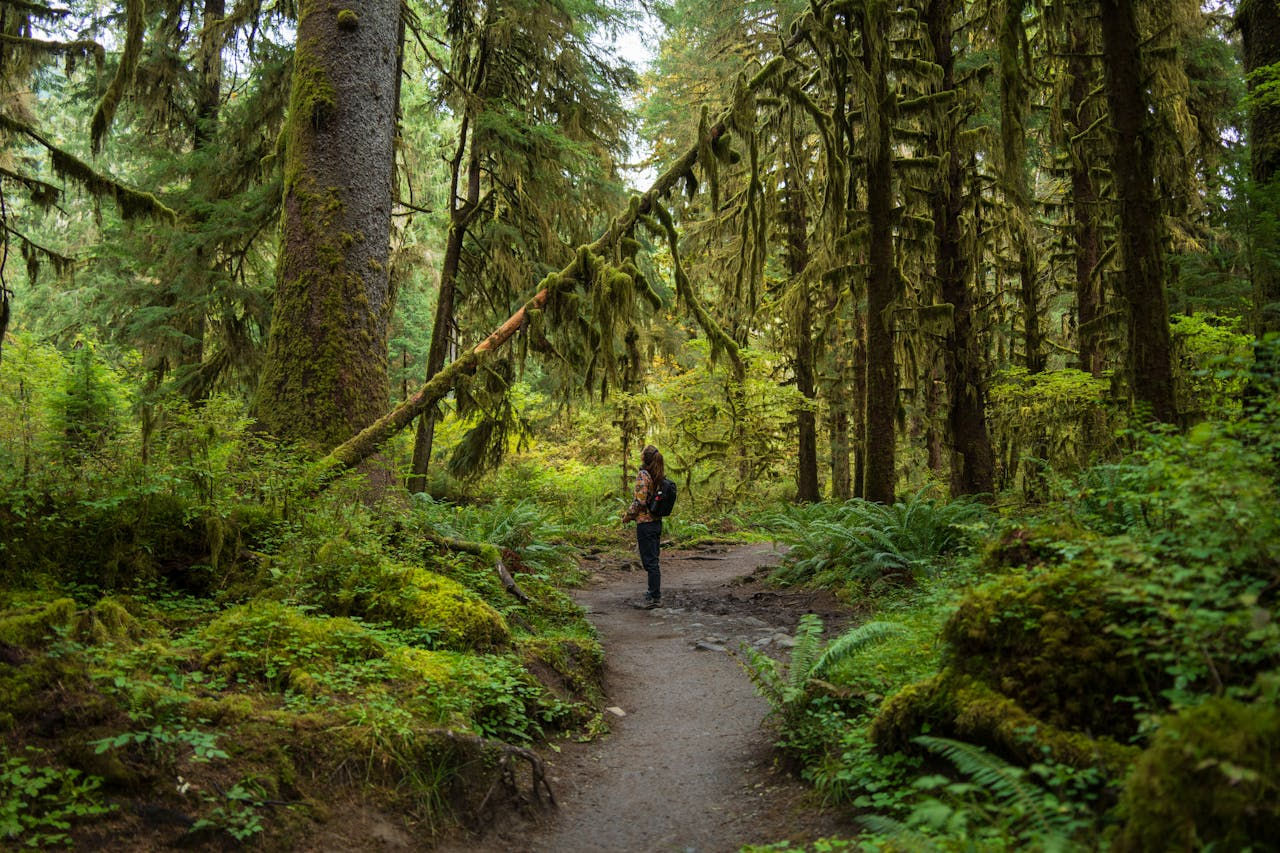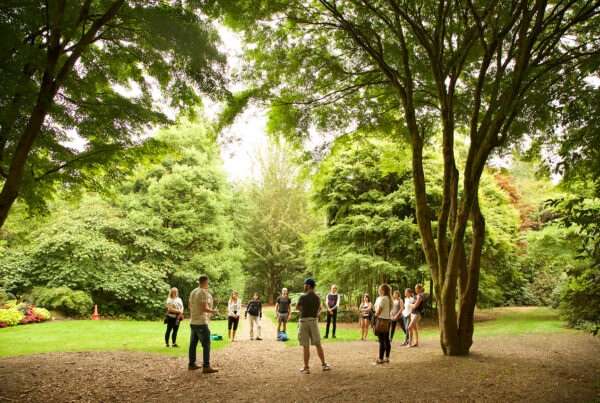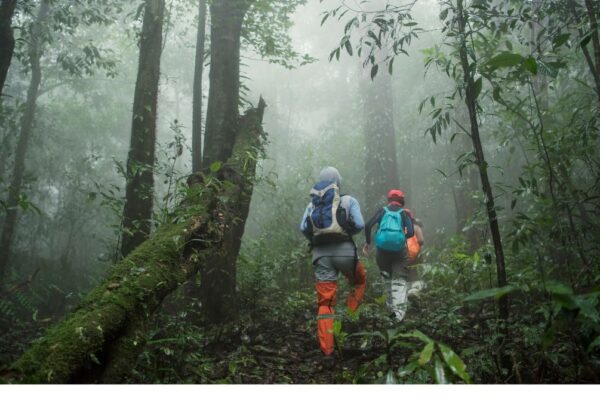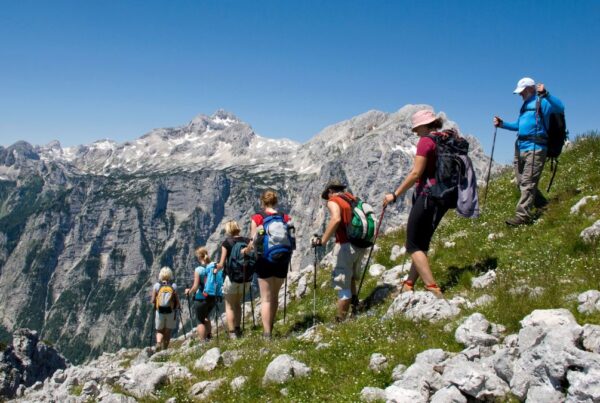The field of nature-based therapy has seen significant growth in recent years and there is growing body of research supporting the physical and mental health benefits of nature connection.
The most well-known form of ecotherapy is forest bathing or what’s known in Japan as Shinrin-Yoku, which translates from Japanese as “bathing in the atmosphere of the forest: (forest bathing). As interest in forest therapy grows, so does the demand for qualified practitioners.
Out of curiosity, I did a lot of research into the different ecotherapy, forest therapy and Shinrin-Yoku inspired certification programs available.
These certification programs range from those deeply rooted in Shinrin-Yoku to more modern interpretations that blend multiple disciplines. Some of the programs emphasize scientific foundations, while others focus on experiential learning or indigenous wisdom. The duration, format, and specific curriculum of each program vary, catering to different learning styles and professional goals.
One of the gaps I noticed with these forest therapy certification programs is many of them don’t do a good job of helping people build sustainable businesses where we they can consistently sell out their workshops, hikes and retreats.
That led me to create Social Creators, a marketing automation and sales appointment booking platform that makes it easy for experience creators to sell their workshops, coaching and retreats.
Now, let’s explore ten certification programs in the growing field of nature-based therapy and outdoor education:
1. Association of Nature and Forest Therapy Guides and Programs (ANFT)
- Program: Certified Forest Therapy Guide Training
- Duration: 6 months
- Pricing: $3,000 – $4,000 USD
- Location: Worldwide (online and in-person components)
ANFT offers a comprehensive program based on Shinrin-Yoku, focusing on the medicinal aspects of nature connection.
It covers scientific research, principles of nature connection and sensory invitation design. The training includes group facilitation skills, risk management, and guiding ethics.
Participants learn the “language of nature connection” to craft immersive experiences. A practicum phase allows trainees to lead walks and receive mentoring, which helps to ensure they’re well-prepared for guiding forest bathing walks upon certification.
2. The Earthbody Institute
- Program: Certified Ecotherapist Training
- Duration: 9 months
- Pricing: $4,500 – $5,500 USD
- Location: California, USA (online options available)
This holistic program integrates ecopsychology, somatic psychology and mindfulness practices. It’s designed for mental health professionals, coaches, and educators who want to incorporate nature-based therapy and healing into their work.
The curriculum covers personal nature connection, clinical applications of ecotherapy, and developing an earth-based practice. It includes experiential learning like wilderness solos and eco-art therapy.
The program emphasizes personal transformation alongside professional development, addressing ecotherapy’s intersections with social and environmental justice.
3. Forest Therapy Institute
- Program: Certified Forest Therapy Practitioner
- Duration: 6 months
- Pricing: €2,500 – €3,500 EUR
- Location: Europe (various countries)
This European program blends Shinrin-Yoku practices with contemporary coaching methodologies. It covers the effects of nature immersion, mindfulness principles, and forest therapy walk design.
Participants learn about forest ecology, the cultural history of human-nature relationships, and research on nature-based health and wellness interventions.
The training emphasizes practical skills, with multiple forest immersions and supervised walk guiding. It also covers professional ethics and establishing a forest therapy practice.
4. Mindful Ecotherapy Center
- Program: Certified Mindful Ecotherapy Facilitator
- Duration: Self-paced
- Pricing: $800 – $1,200 USD
- Location: Online
The Mindful Ecotherapy Center offers a comprehensive program that integrates mindfulness practices with ecotherapy principles. It’s designed for mental health professionals and educators who are looking to incorporate nature-based interventions into their work.
The curriculum covers the foundations of ecotherapy, mindfulness techniques, and the scientific research supporting nature’s impact on mental health. Participants learn to design and facilitate mindful nature experiences outdoors.
This self-paced program emphasizes practical application, with modules on adapting techniques for urban environments and integrating ecotherapy into existing practices. It also includes guidance on ethical considerations and professional development in the field of ecotherapy.
5. Wilderness Awareness School
- Program: Nature-Connection Mentoring Certification
- Duration: 9 months
- Pricing: $5,000 – $6,000 USD
- Location: Washington, USA
This certification program from the well-known Wilderness Awareness School’s late Ingwe (Norman Powell) and Jon Young focuses on deep nature connection skills and mentoring techniques, which are rooted in indigenous wisdom and natural education philosophies.
Participants learn wilderness skills, child development theories, and nature-based curriculum creation. The Nature Mentoring Certification emphasizes the mentor’s personal journey of nature connection and group storytelling.
Graduates are prepared to lead nature connection programs outdoors, address cultural repair and community healing through nature.
6. Prescott College
- Program: Graduate Certificate in Adventure-Based Ecotherapy
- Duration: 1 year
- Pricing: $8,000 – $10,000 USD
- Location: Arizona, USA (low-residency program)
This program blends adventure therapy techniques with ecopsychology principles. It covers ecopsychology theory, adventure therapy, wilderness skills, and research methods.
The curriculum teaches design and facilitation of therapeutic experiences in various natural settings. It addresses ethical considerations and risk management in outdoor therapy.
The low-residency format combines online learning with intensive field courses, which emphasizes experiential learning and practical application.
7. Forest Therapy Hub
- Program: Certified Forest Bathing Guide
- Duration: 3 months
- Pricing: $1,500 – $2,000 USD
- Location: Online (based in Portugal)
This program offers a blend of Shinrin-Yoku and broader forest therapy techniques, with a Portuguese influence. It covers scientific foundations, forest ecology, and mindfulness in nature.
Participants learn to design and guide forest bathing experiences, with a focus on Mediterranean and Atlantic forest ecosystems.
The training emphasizes practical skills and business development, preparing graduates to offer forest therapy where they live.
8. Eco-Institute at Pickards Mountain
- Program: Earth Advocate Certification
- Duration: 5 months
- Pricing: $4,500 – $5,500 USD
- Location: North Carolina, USA
This holistic program integrates ecological education with personal growth work. It covers permaculture, regenerative agriculture, eco-psychology, and systems thinking.
The curriculum includes community facilitation techniques and sustainable living practices. A residential component provides hands-on experience in an eco-community.
Graduates are prepared to lead environmental education programs and sustainability initiatives in natural settings and run their own permaculture-inspired experiential learning workshops.
9. Natural Wellness Academy
- Program: Certified Forest Therapy Guide
- Duration: Self-paced
- Pricing: $1,000 – $1,500 USD
- Location: Online
This flexible, self-paced program covers the art and science of forest therapy. It includes the principles of nature immersion, forest ecology, and cultural context of forest bathing.
Participants learn to design and lead forest therapy walks, adapt techniques for various environments, and integrate mindfulness practices.
The course focuses on practical application and includes some basic training on business development, with guidance on marketing and collaborating with healthcare providers.
10. Global Institute of Forest Therapy
- Program: Certified Forest Therapy Guide
- Duration: 6 months
- Pricing: $2,500 – $3,500 USD
- Location: Online with in-person practical in various global locations
The Global Institute of Forest Therapy offers a Canadian perspective on forest therapy, drawing from practices around the world. It’s suitable for wellness professionals and nature enthusiasts alike.
The program covers the science of forest therapy, guiding techniques, and cultural approaches to nature connection from different countries. Participants learn to adapt forest therapy practices to diverse environments and cater to different population groups.
They are one of the smaller forest therapy guide companies but they are working to offer opportunities for international collaboration and are hosting their in-personal practical retreats in different global locations.
Closing Thoughts On Ecotherapy And Forest Therapy Certifications
As you can see, the field of nature-based therapy is rich with opportunities for learning and professional development.
From traditional Japanese forest bathing practices to leading nature retreats and wilderness therapy expeditions, the breadth of experiential learning approaches reflects the multi-faceted relationship between nature and human well-being.
The growing number and variety of these programs underscore the increasing recognition of nature’s powerful role in promoting physical and mental health. As our world faces mounting environmental challenges and rising rates of stress-related illnesses, the skills taught in these programs will become ever more valuable.
For those considering a career or further outdoor education in this field, the choice of program you will decide to take will involve balancing a variety of factors:
- Your professional background and future goals
- The specific populations or settings you wish to work with
- Your personal philosophy regarding nature connection and healing
- The format of learning that best suits your lifestyle and learning style
- The particular aspects of nature therapy that most interest you
It’s worth noting that many of these certification programs offer introductory workshops or short courses, which can be an excellent way to explore the field before committing to a full certification cohort. You may also want to experiment with forest bathing invitations for yourself.
Additionally, as the field of ecotherapy evolves, we can expect to see continued innovation in educational program offerings and potentially new forms of accreditation that integrate these mindful practices into schools, hospitals and corporate environments.
Ultimately, the journey into nature-based therapy is not just a professional path, but a personal one as well. These programs offer not only skills and knowledge, but also the opportunity for deep personal growth and a transformed relationship with the natural world.
Whether you’re a mental health professional looking to incorporate nature into your practice, an outdoor enthusiast seeking to share the benefits of nature connection with others, or someone on a personal journey of healing and growth, there’s likely a program here that can support your goals.
As you consider your options, remember that the most important qualification in this field of ecotherapy is a genuine passion for both human well-being and deep connection with the natural world. With that foundation, any of these programs can provide you with the tools to make a meaningful impact in people’s lives and contribute to a healthier relationship between humanity and nature.
The future of healthcare, wellness, and environmental stewardship may well depend on the insights and practices being developed in this emerging field of nature-based therapies. By choosing to educate yourself in this area, you’re not just investing in your own future, but in the well-being of your community and the planet as a whole.
- 10 Sustainable Travel Trends Driving The Future of Tourism - March 9, 2025
- 10 Tips To Sell Out Your Transformational Retreats In 2025 - February 20, 2025
- Build 10 Habits That Free Up Your Time With Mindful Coaching - February 11, 2025





